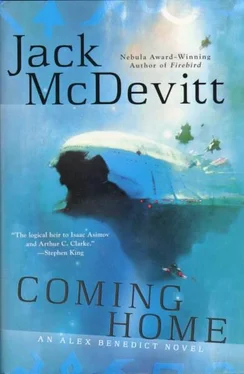Dracula, as far as we know, appeared in only one novel, but his name survives. He was apparently a physician. His name is associated with blood extraction. If that seems grim, it helps to recall that he practiced in an era during which invasive surgery was common.
Sherlock Holmes was lost for six thousand years before being rediscovered thirty years ago by people working with the Goldman Institute. Now, at least on Rimway, he’s enormously popular. His name never really disappeared from the language. It remains synonymous with deductive skills.
Superman and Batman got their start, we think, during the twenty-fourth century. Except for a brief period during the Dark Age, they’ve never gone away.
* * *
We joined a guided tour. The guide was explaining why so much had been lost, and how active efforts at recovery have been under way for centuries and would probably continue indefinitely. “When the early colonists first went out,” she said, “they took a lot of things with them, especially books and movies. A lot of it is still out there, we think, but we have never really organized things to bring it all together.”
A teenager wanted to know why they hadn’t combined the internet data yet. “After all,” he said, “it’s been thousands of years.”
The tour guide laughed. “I’d guess it’s because they keep growing. Keep acquiring information. I’m not sure what kind of effort it would take to figure out what’s missing from our system. Part of the problem with losing material is that very often you also lose the memory that it existed. In time, you no longer have a record of what’s gone. Digging through other data systems sounds like a good idea, but we don’t always know what we’re looking for. It tends to happen by accident. We don’t know, for example, how many Shakespearean plays there were. When we discovered The Merry Wives of Windsor , nobody here had ever even heard of it. It was a complete shock. They had it at the City on the Crag, but nobody here had come across it.”
“Are some of his other plays out there?”
“Possibly,” said the tour guide. “We hope. We have people visiting every world in the Confederacy, looking for that and whatever else might be available.”
* * *
“At one time,” said Alex, “archeology was just pick-and-shovel operations. Today it’s also a series of electronic searches.” We were standing in front of the statue of a man in the main entrance hall. It had been recovered from Lake Washington, but its identity was lost.
The museum has pictures of athletes in various types of uniforms, some wearing helmets, some outsized gloves, some carrying long sticks. People still play soccer, and we know a little about the other sports, but they’re long gone. Nobody’s even sure when they died out. He stared up at the statue. A phrase was engraved across the ceiling which is associated with him: I have sworn upon the altar of God eternal hostility against every form of tyranny over the mind of man.
I’m not sure who he was, but I suspect I’d have liked the guy.
* * *
Baylee and Southwick were included with a list of contributors framed in the entry. “I’m not sure what we’d do without people like them,” I said. “Gabe’s name should be up there, too.”
I regretted the comment immediately. It was halfway out before I thought to shut it down, and by then it was too late. “You have to contribute to this museum to get that kind of recognition,” said Alex. “His name is up in a few places.” He was close to saying something more, but he cut it off. “Yeah,” he said finally, “he’s in good company.”
Time to change the subject: “How about we get something to eat?”
“Okay. That sounds like a good idea.”
We left the museum and crossed the street to the Barrista Grill. Soft music drifted through the dining area.
“So what’s next?” I asked, as we took a table near a window. The sky was filled with clouds.
“I don’t know. If it weren’t for the attack on the boat, I’d be about ready to give it up and head home. But somebody wants us to stop. Why?”
“I have no idea.”
“Madeleine O’Rourke changed the game.” The candles blinked on, and the table described a couple of specials and asked what we’d like. We ordered a bottle of wine with our meal and sat back to relax. Alex was lost in thought. I stared out the window, watching as rain began to fall. Two people had paused outside trying to make up their minds about coming in. The rain settled the matter for them.
The wine arrived.
Finally, I asked him what he was thinking about.
“ Close Encounters of the Third Kind ,” he said.
“Did you want to go watch it tonight?”
“That’s not what I mean. It struck me that when we were trying to find Larissa, we limited the search too much.” He picked up the bottle and popped the cork.
“You mean we should have looked off-world?”
“Very good.”
“There’s no colony with that name.”
“No, there isn’t. But there are six places in the Confederacy. Two states, two islands, and a mountain. We can eliminate them because they’re all on worlds that we hadn’t reached during the Dark Age.”
“You only named five.”
“The sixth one is a moon. Orbiting Neptune.”
“In this system?”
“Yes.”
“Beautiful.”
Alex smiled. “Let’s hope.” He took a deep breath and filled the glasses. “By the way, the place has a site that would have been perfect for hiding the artifacts.”
“Really?” I said. “What’s that?”
“There was a research station built out there during the twenty-fifth century. It was abandoned after about eighty years. Or four centuries. Depends whose history you read. In any case, it would have been a tempting place to store the museum artifacts.”
“Sounds more promising than the Aegean.”
“Yes. We assumed the reference was to the Greek area because Zorbas was born near there. But that might have gotten us thinking small.”
I picked up my glass. “Sounds good to me.”
“Maybe we have it this time.” He lifted his and took a deep breath. “Let’s hear it for the Neptunians.”
The human experience, for us, is a period stretching back over a few thousand years, starting with the Sumerians and extending to the first manned Mars flight. And already we have lost parts of it. What happened to the Minoan civilization? Or the one that prospered thousands of years ago in the Indus Valley? Who created the Sphinx? How did an ancient people move the Stonehenge rocks? Or construct mathematically correct pyramids? Did the Ark of the Covenant ever really exist? One has to wonder how much will have gone missing when another few thousand years have passed.
—Joseph McMurtrie,
Looking Forward, 2312 C.E.
The jump out to Neptune took almost no time at all, but we surfaced almost a million kilometers from Larissa. “Make yourself comfortable for a couple of days,” I told Alex. And he did, settling in with a twenty-second-century book he’d picked up that insisted there was nothing left for science to do. I’ve mentioned that Alex, like his customers, enjoys the feel of objects that have passed through hands in ancient times. But he doesn’t stop there. He also has a passion for ideas from other eras, concepts, points of view. I don’t know anyone else who reads Plato for sheer pleasure.
If you sit by a couch that had once served Owen Watkin, he’d say, or Albert Einstein, you can almost feel their presence. He never tried to explain the psychology of it. It was simply, for him and for his clients, a reality. It was the reason that he never felt guilty about selling artifacts to his customers rather than donating them to museums. Put it in a museum, he’d say, and people wander past and stare at it. But that’s nothing other than a superficial reaction. The people who come to Rainbow Enterprises want something more. They hope to share their time, their lives , with an historical figure they’ve come to know. To reach across the centuries, the millennia, and touch Serena Black. And I know how that sounds. There’s no way I can explain that to anyone who doesn’t already understand why some people love antiques. But Alex concedes that sitting in light emanating from a lamp once owned by a celebrity doesn’t really allow you to hold a conversation with that person. To do that, you need an avatar. Or, for someone from an earlier era, a book. I should mention, by the way, that it’s especially difficult to explain the passion when I don’t really share it. Alex tells me that he feels sorry for me. And when I tell him maybe in time I’ll acquire the taste, he says no. He tells me the boat has left.
Читать дальше












